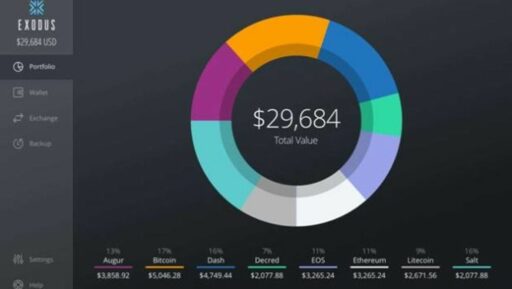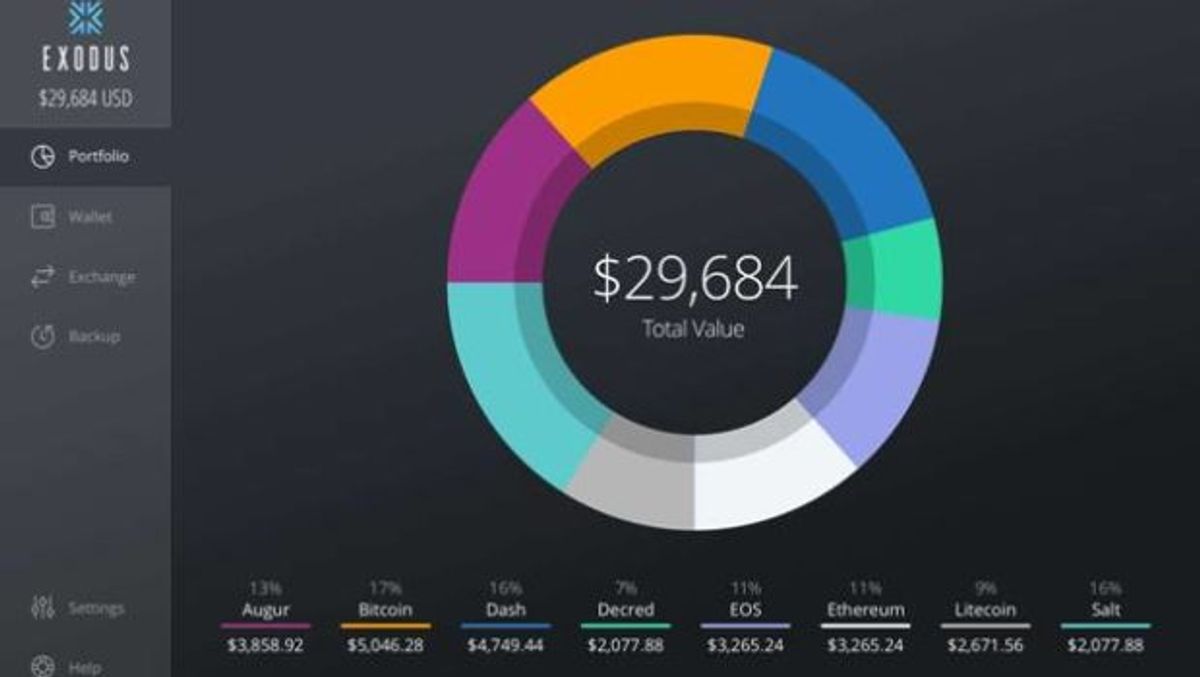In the dynamic world of cryptocurrency, securing your digital assets is paramount. Desktop crypto wallets offer a blend of security and accessibility, but with so many options available, it can be challenging to choose the right one. This article dives into the top desktop crypto wallets to consider, evaluating their security features, user experience, and overall functionality to help you make an informed decision for your crypto needs in 2024.
Key Takeaways
- Trust, Exodus, and Ledger are among the top desktop wallets, offering a mix of security-focused features and streamlined crypto experiences.
- Desktop wallets such as Trezor and KeepKey provide open-source code and hardware wallet options, catering to a variety of cryptocurrency management needs.
- Wallets like Coinbase, MetaMask, and ZenGo are ideal for beginners and those seeking integration with dApps, while Crypto.com and SafePal excel in DeFi and DEX integration.
- When selecting a wallet, prioritize safety features like two-factor authentication, backup options, and consider the wallet’s reputation and multi-currency support.
- Our top picks for 2024 take into account the balance between safety, convenience, and the ability to manage a diverse range of cryptocurrencies.
Evaluating the Security of Top Desktop Crypto Wallets

Trust: A Security-Focused Wallet for Long-Term Investors
Trust Wallet is tailored for those who adopt a ‘buy and hold’ investment approach, prioritizing the security of digital assets for the long haul. The wallet’s primary advantage is its robust security measures, ensuring that only the user has access to their private keys, thereby maintaining complete control over their funds.
- Compatible with a wide range of cryptocurrencies
- Staking capabilities built-in
However, it’s worth noting that Trust Wallet does not offer cold storage options and has received some criticism for its customer support.
With a straightforward interface and comprehensive security features, Trust Wallet is a top choice for investors seeking a secure and user-friendly environment for their long-term crypto holdings.
The wallet’s support for an extensive array of cryptocurrencies, including popular coins like BTC, ETH, BNB, TRX, and numerous altcoins, makes it a versatile option for diverse portfolios. The development team’s commitment to regularly updating the app to support new assets further enhances its appeal to investors.
Exodus: The Best Desktop Wallet for Streamlined Crypto Experience
Exodus stands out as a desktop wallet that combines ease of use with robust security features. It’s designed to cater to both beginners and experienced users, offering a user-friendly interface and a variety of services. The wallet supports over 225 cryptocurrencies, making it a versatile choice for managing a diverse portfolio.
The desktop application is the heart of Exodus, with consistent updates every two weeks to ensure optimal performance and security. It’s available on Windows, Linux, and Mac, and seamlessly integrates with mobile apps and Trezor hardware wallets for enhanced security.
Exodus’s built-in exchange and staking features add to its appeal, allowing users to trade and earn rewards directly within the wallet.
Here’s a quick look at the pros and cons of Exodus:
-
Pros:
- Multi-platform support (desktop, mobile, browser)
- Regular updates and a strong focus on security
- Integration with Trezor for hardware wallet security
- Built-in exchange and staking capabilities
-
Cons:
- May not support every cryptocurrency on the market
- Advanced features might require a learning curve for new users
Ledger: A Safe Hardware Wallet for Every Crypto Need
Ledger has established itself as a trusted name in the realm of crypto security, offering hardware wallets renowned for their robust protection. The integration of a Secure Element chip, akin to those used in payment systems, elevates the security of Ledger’s devices, ensuring that your digital assets are safeguarded against unauthorized access.
Ledger’s range of wallets supports an impressive array of over 5,500 coins and NFTs, making it a versatile choice for diverse portfolios. Users can manage their assets conveniently through the Ledger Live app, compatible with various devices.
Ledger’s commitment to security without compromising on functionality makes it an ideal choice for both beginners and seasoned crypto holders.
Here’s a quick glance at what Ledger offers:
- Secure Element chip for enhanced security
- Support for over 5,500 coins and NFTs
- Compatibility with Ledger Live app
- A popular choice among crypto enthusiasts
Trezor: An Open-Source Wallet for Thousands of Cryptocurrencies
Trezor stands as a paragon of security in the realm of hardware wallets, supporting a vast array of over 8,000 coins and tokens. Its open-source nature is not just a nod to transparency but a robust security feature. Anyone can review the code, ensuring that vulnerabilities are identified and addressed by a vigilant community of developers.
The Trezor Model T, in particular, is a cold wallet that combines security with convenience. It boasts a color touch screen and supports more than 1,400 cryptocurrencies, including major players like BTC, ETH, ADA, and USDT. While the Model T comes with a price tag of $179, it represents a worthwhile investment for those seeking peace of mind.
Trezor’s commitment to security is further exemplified by its pioneering features, such as recovery seed and passphrase protection, which were first introduced with the Trezor One.
Despite its many benefits, potential buyers should be aware of the cost associated with this level of security. However, for many, the combination of competitive pricing, extensive support for cryptocurrencies, and the assurance of open-source software makes Trezor an attractive option.
KeepKey: A User-Friendly Hardware Wallet With Staking Features
KeepKey distinguishes itself in the hardware wallet market with its robust metal casing and a large display that enhances user interaction. It supports a vast array of cryptocurrencies, including over 40 top coins and a plethora of ERC-20 tokens through MyEtherWallet integration.
The wallet’s security measures are commendable, featuring PIN protection and the ability to generate an unlimited number of wallet addresses. Notably, KeepKey operates without a traditional OS, rendering it impervious to common digital threats like viruses and malware.
KeepKey’s integration with various software like Mycelium and Electrum, along with its compatibility with WalletConnect-supported dApps, makes it a versatile choice for both new and experienced users.
However, it’s important to note that while KeepKey facilitates asset exchange within the wallet, it lacks a dedicated mobile app and built-in staking tools. Despite these drawbacks, its economical price point and strong security features make it a contender for those seeking a reliable cold storage solution.
Desktop Wallets: Balancing Accessibility and Security

Understanding the Pros and Cons of Desktop Wallets
Desktop wallets offer a middle ground between the heightened security of cold storage and the convenience of mobile wallets. They are software programs that reside on your personal computer, providing a secure environment for your digital assets. Desktop wallets are ideal for users who prioritize security and prefer managing their cryptocurrencies from a computer.
Pros and Cons of Desktop Wallets:
- More secure than mobile and web wallets due to reduced exposure to online threats.
- Full control over keys and funds, enhancing the sense of ownership.
- Typically offer good privacy, as many do not require personal information.
- Support for multiple cryptocurrencies, allowing for a diverse portfolio.
However, there are drawbacks:
- Vulnerable to malware and viruses if the computer is compromised.
- Not as convenient for on-the-go transactions compared to mobile wallets.
- Dependence on the computer for access, which can be limiting if mobility is a necessity.
While desktop wallets provide a secure way to manage cryptocurrencies, users must remain vigilant against potential malware or phishing attacks that could compromise their computer.
When considering a desktop wallet, it’s important to weigh these factors against your personal needs and security requirements.
Key Features to Look for in a Secure Desktop Wallet
When selecting a desktop wallet, security should be your top priority. Look for advanced security features such as encryption and backup options, which are crucial for protecting your assets. Desktop wallets offer a higher level of security compared to mobile and web wallets due to their limited internet exposure, but this also depends on your computer’s security practices.
- Use Strong Passwords
- Backup Your Wallet
- Keep Software Updated
- Beware of Phishing Attacks
These steps are essential for maintaining the integrity of your wallet. Additionally, consider wallets that support multiple cryptocurrencies to avoid the hassle of managing several wallets. Two-factor authentication, user-friendly interfaces, and regular updates are also key features that enhance security and usability.
While desktop wallets balance security and accessibility, always remember that the overall safety also hinges on your personal security measures and vigilance against threats like phishing.
Our Recommendations for User-Friendly Desktop Wallets
When it comes to user-friendly desktop wallets, the market offers a variety of options that cater to both novice and experienced users. Selecting a wallet that combines ease of use with robust security features is crucial for a seamless crypto management experience.
- Trust Wallet stands out for its focus on security, making it a solid choice for long-term investors.
- Exodus offers a streamlined experience, with an intuitive interface that’s perfect for daily use.
- For those seeking hardware wallet options, Ledger and KeepKey provide an extra layer of security while still being accessible from your desktop.
It’s essential to evaluate the wallet’s reputation, development team, and the frequency of updates to ensure ongoing support and security.
Multi-currency support and compatibility with hardware wallets like Ledger, Trezor, and KeepKey are additional features that enhance the user experience. Remember to look for wallets that offer two-factor authentication and reliable backup options to safeguard your digital assets.
Diverse Crypto Wallet Options: A Comparative Overview

Coinbase: A Protected and Versatile Wallet for Beginners
Coinbase Wallet stands out as a top pick for secure crypto wallets, especially for those who are new to the cryptocurrency world. Its integration with the broader Coinbase ecosystem allows users to access a wide range of services, making it a highly functional product.
Pros & Cons of Coinbase Wallet:
- Access to an extensive range of coins, tokens, and NFTs
- Simple design for easy navigation
- Enhanced security with multi-signature and two-factor authentication (2FA)
However, users should be aware of the higher-than-average fees for transactions outside the Coinbase ecosystem and the fact that it is primarily available on mobile and tablet devices.
Coinbase Wallet’s user interface is designed to be intuitive, with a straightforward three-tab layout and clear functions. It supports over 100,000 digital assets, including popular coins like Bitcoin, Litecoin, Dogecoin, and BNB, as well as all ERC-20 tokens and tokens on EVM-compatible blockchains.
For beginners, the Coinbase Wallet offers a comprehensive gateway to the crypto universe. Its user-friendly design, educational resources, and robust security features, such as multi-signature and 2FA, set the stage for a successful and secure crypto journey.
MetaMask: The Most Popular Wallet for dApps and Browser Integration
MetaMask stands out as the go-to wallet for over 30 million monthly active users, particularly for those engaging with decentralized applications (dApps) and seeking seamless browser integration. Its user base spans a diverse range of cryptocurrency enthusiasts, from beginners to seasoned investors.
MetaMask’s ease of use and broad compatibility make it a top choice for interacting with the Ethereum ecosystem and beyond. It supports a multitude of networks, including Polygon, BNB Chain, and Avalanche, and facilitates access to NFT marketplaces like OpenSea.
The wallet’s open-source foundation invites continuous scrutiny and improvements by the developer community, enhancing its security and reliability.
Here are some key features of MetaMask:
- Available as a browser extension and mobile app
- Compatible with Chrome, Brave, Opera, Edge, and Firefox
- Supports Ethereum and a wide array of other blockchains
- Enables direct interaction with dApps and NFT platforms
MetaMask’s popularity is not just a testament to its functionality but also to the trust it has garnered within the crypto community.
ZenGo: A Keyless Wallet for Easy Management
ZenGo stands out as a leader in the keyless crypto wallet arena, offering a simplified yet secure experience for managing digital assets. By forgoing traditional recovery phrases, ZenGo leverages Multi-Party Computation (MPC) technology to enhance security and minimize common points of failure.
The wallet’s design prioritizes ease of use, with a straightforward interface that supports quick integration for browser use and bill payments. Users can confidently secure their assets, thanks to secure backup options through iCloud or Google Drive, coupled with biometric facial recognition for an additional layer of protection.
ZenGo’s compatibility with WalletConnect streamlines the workflow for dApp users, offering a hassle-free connection process that is especially beneficial for those frequently transferring crypto assets.
Despite its innovative approach, ZenGo has faced some criticism, particularly from users who prefer having direct control over their private keys. However, its security measures, including three-factor authentication and biometric encryption, provide a compelling argument for its use as a non-custodial wallet.
- Pros:
- Keyless security model
- Intuitive user interface
- Seamless dApp integration
- Cons:
- Lack of private key control
- Limited feature availability in some regions
Crypto.com: The Best DeFi Wallet for Effortless Yield Generation
The Crypto.com DeFi Wallet stands out in the decentralized finance landscape for its user-friendly features and commitment to security. It provides a seamless experience for both new and seasoned investors looking to engage with DeFi protocols.
Offering both iOS and Android applications, the wallet ensures that users can manage their portfolios anywhere, at any time. The ‘one-click farming’ feature is particularly noteworthy, simplifying the process of staking and earning rewards within the DeFi ecosystem.
The Crypto.com DeFi Wallet is not just about convenience; it’s about empowering users with full control over their private keys and funds, aligning with the ethos of decentralized finance.
Here’s a quick overview of the wallet’s capabilities:
- Complete control over digital assets and private keys
- Easy setup and user-friendly interface
- Direct interaction with DeFi protocols for one-to-one crypto swaps
- ‘One-click farming’ feature for effortless yield generation
- Mobile app availability for on-the-go portfolio management
SafePal: A Fortress Hardware Wallet With DEX Integration
SafePal stands out as a fortress of security for cryptocurrency enthusiasts, offering a hardware wallet that integrates seamlessly with decentralized exchanges (DEX). This integration not only enhances security but also provides the convenience of managing assets directly within the SafePal ecosystem.
SafePal’s unique approach to combining hardware and software solutions caters to a variety of user needs, from the security-conscious to those valuing flexibility.
The wallet supports a multitude of cryptocurrencies and tokens, ensuring that users have a wide range of investment options at their fingertips. With features like the in-app ‘SafePal Swap’, the need for external exchanges is reduced, keeping private keys secure.
- Multi-chain support
- In-app decentralized exchange
- Robust security features
SafePal’s offering is particularly attractive to investors looking to generate passive income through their DeFi assets, thanks to its competitive Annual Percentage Yield (APY) rates.
The Ultimate Guide to Selecting Your Ideal Crypto Wallet

Assessing Wallet Types: Cold Hardware vs. Hot Software
When it comes to securing your digital assets, understanding the difference between cold hardware and hot software wallets is crucial. Cold wallets, such as hardware devices or paper printouts, store your crypto keys offline, providing a robust defense against online threats. Hot wallets, on the other hand, are connected to the internet, offering convenience for frequent transactions but are more vulnerable to cyber attacks.
The choice between a cold hardware wallet and a hot software wallet often boils down to a trade-off between security and convenience.
Here’s a quick comparison of their features:
-
Cold Wallets (Hardware/Paper):
- Superior security from offline storage
- Physical possession required for access
- Often involves additional security measures like PINs
-
Hot Wallets (Software/Apps):
- Easier access for daily transactions
- Susceptible to online threats like phishing
- Convenient for active trading and use
While cold wallets are generally recommended for their enhanced security, particularly for long-term storage, hot wallets provide the ease of use necessary for those who trade more frequently. Users must weigh their specific needs against the risks and benefits of each wallet type to make an informed decision.
Security Features to Prioritize in Your Crypto Wallet
When fortifying your crypto wallet against cyber threats, it’s crucial to prioritize certain security features. Encryption and multi-factor authentication stand as the first line of defense, ensuring that your wallet and its contents remain inaccessible to unauthorized users. Cold storage options, which keep your private keys offline, provide an additional layer of security against online attacks.
- Encryption
- Multi-factor authentication
- Cold storage
- Open-source practices
Emphasizing these security features can significantly reduce the risk of unauthorized access and potential theft.
Moreover, the strength and reputation of the wallet’s development team can be indicative of the wallet’s reliability and the support you can expect. Regular updates and backup options are also essential, as they ensure that your wallet stays secure against emerging threats and that you can recover your assets in case of unforeseen events.
Compatibility and User Experience: Making the Right Choice
When selecting a crypto wallet, compatibility and user experience are pivotal. A wallet should align with your devices and lifestyle, ensuring seamless integration into your daily routine. Here are some key considerations:
- Ease of use is paramount, especially for those new to the crypto space. An intuitive interface can make all the difference in your daily interactions with your digital assets.
- Multi-currency support is a must for investors who diversify their portfolio across various cryptocurrencies.
- Regular updates and two-factor authentication enhance security and ensure your wallet stays in step with the latest threats.
Remember, the best wallet for you is one that not only meets your security needs but also offers the convenience and accessibility for effective digital asset management.
In our evaluation, we also factored in real-world usage and feedback. This approach provides a comprehensive view of how each wallet performs in everyday scenarios, helping you make an informed decision based on actual user experiences.
Final Thoughts: Making an Informed Wallet Choice

The Importance of Safety and Convenience in Crypto Wallets
In the realm of cryptocurrency, the equilibrium between safety and convenience is paramount. Security measures are indispensable, yet if they impede daily use, the wallet’s practicality diminishes. Conversely, a wallet that prioritizes ease may compromise on security, leaving assets vulnerable.
Balancing these aspects is not just about peace of mind; it’s about practicality in managing digital assets effectively.
Consider the following points when choosing a wallet:
- User-friendly interfaces facilitate monitoring and transactions.
- A reputable development team indicates reliability and ongoing support.
- Multi-currency support is essential for those dealing with various cryptocurrencies.
- Security features like two-factor authentication, backup options, and regular updates are non-negotiable.
By weighing these factors, you can select a wallet that aligns with your security requirements while offering the convenience needed for regular transactions.
Additional Considerations for a Tailored Wallet Experience
When selecting a crypto wallet, it’s crucial to consider factors beyond the basic security features. Ease of use is paramount for a seamless experience, especially for those new to the crypto world. Wallets with intuitive interfaces allow for straightforward monitoring and transactions, which can significantly enhance user satisfaction.
- Look for wallets with a strong reputation and a robust development team, as these often provide better reliability and support.
- Opt for wallets that offer multi-currency support to avoid the hassle of managing multiple wallets.
- Ensure the wallet includes essential security features like two-factor authentication, backup options, and regular updates to protect your digital assets.
By evaluating these additional aspects, you can choose a crypto wallet that not only meets your security needs but also offers the convenience and functionality necessary for effective digital asset management.
Our Top Picks: The Best Crypto Wallet in 2024
As we navigate through the myriad of options in the crypto wallet landscape, our top picks for 2024 stand out for their robust security, ease of use, and wide cryptocurrency support. Whether you’re a beginner or a seasoned investor, these wallets cater to a range of needs and preferences.
For those new to the crypto world, the Coinbase Wallet shines as a user-friendly choice, making it the best for beginners. On the other hand, the Trezor Model T is lauded for its top-notch security features, setting the standard for hardware wallets.
Here’s a quick overview of our selected wallets and their defining attributes:
- Coinbase Wallet: Best for beginners
- Trezor Model T: Best security features
- Ledger Nano S Plus: Best hardware wallet
- MetaMask: Best for Ethereum users
- TrustWallet: Best for mobile users
- Exodus: Best for a streamlined desktop experience
- Crypto.com: Best for DeFi enthusiasts
- SafePal: Best hybrid wallet
Choosing the right crypto wallet is a critical decision that can significantly impact your digital asset management and security.
Our recommendations are based on extensive research and user feedback, ensuring that you have access to the most reliable and convenient wallets available today.
Conclusion
In the ever-evolving landscape of cryptocurrency, securing your digital assets is paramount. Our comprehensive review of desktop crypto wallets has highlighted the importance of balancing security with convenience. From the robust, multi-signature hardware wallets like Ledger and Trezor to the streamlined and user-friendly desktop experiences offered by Exodus and Electrum, there is a wallet to suit every investor’s needs. Remember to prioritize wallets with strong security protocols, multi-currency support, and user-friendly interfaces. As you embark on your crypto journey, choose a wallet that not only meets your security requirements but also aligns with your investment strategies and ease of use preferences. Stay vigilant, stay secure, and may your digital assets flourish.
Frequently Asked Questions
What are the best desktop crypto wallets to consider for security and functionality?
The top desktop crypto wallets for security and functionality include Trust, Exodus, Ledger, Trezor, KeepKey, and Coinbase. These wallets offer a range of features like multi-factor authentication, biometrics, multi-signature support, and strong security protocols.
What should I look for in a crypto wallet to ensure maximum security?
When ensuring maximum security, look for features such as two or multi-factor authentication, biometrics, multi-signature support, open-source code, strong security protocols for transactions, and regular updates. Avoid hardware with additional points of failure like Bluetooth.
Are desktop wallets more secure than other types of wallets?
Desktop wallets are generally more secure than mobile and web wallets because they are less exposed to online threats. They strike a balance between the high security of cold storage and the convenience of being more accessible.
What are the advantages and risks associated with desktop wallets?
Desktop wallets offer better security than mobile and web wallets and do not typically require personal information, enhancing privacy. However, they are at risk of malware or phishing attacks. Recovery options often include seed phrases or backup files.
Can desktop wallets manage multiple cryptocurrencies?
Yes, most desktop wallets support multiple cryptocurrencies, offering flexibility in asset management. This allows users to manage various digital assets without needing multiple wallets.
What are the key considerations when selecting the best crypto wallet in 2024?
Key considerations when selecting the best crypto wallet include the type of wallet (cold hardware or hot software), security features, compatibility with your cryptocurrencies, user-friendliness, and the wallet’s reputation and support.





